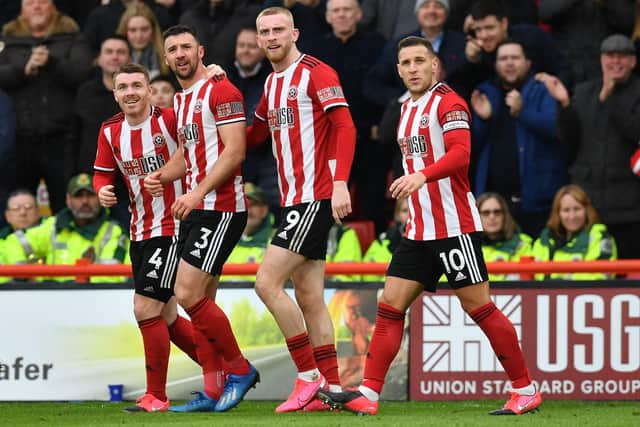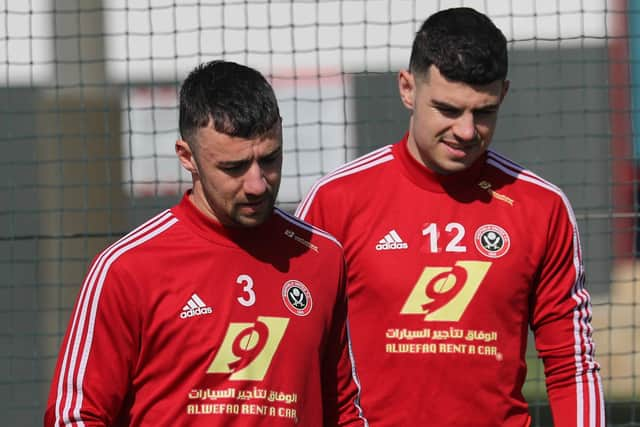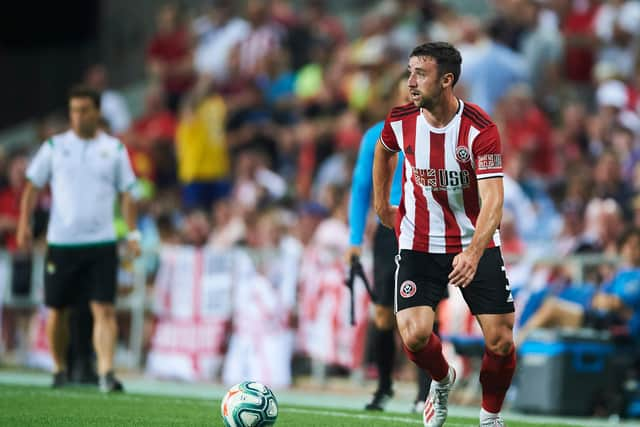Sheffield United's Enda Stevens proves it is possible for footballers to be ruthless performers and socially responsible
and live on Freeview channel 276
Those childhood trips to Richmond Park left their mark on Enda Stevens. To such an extent, nearly two decades after first watching St Patrick’s Athletic there with his father, he admits they helped make him the man that he is today.
“Growing up, I used to go to St Pats with my dad,” Stevens says. “They really were great times. Brilliant times in fact. Learning about local football, your local players and local teams.”
Advertisement
Hide AdAdvertisement
Hide AdAlthough he didn’t know it then, the Sheffield United defender would go on to emulate his heroes by reaching the pinnacle of the game - representing the likes of Aston Villa and Portsmouth before, having pulled on the red shirt of Athletic himself, winning international honours with the Republic of Ireland and helping Chris Wilder’s side reach the Premier League.
But it was the terraces of that historic, snug stadium in his home city’s western suburbs where Stevens’ personality and perspective on life was shaped. Not the glitzy bars and VIP rooms top-flight players can frequent.
The 29-year-old’s values became apparent at the beginning of the coronavirus crisis when, as the game in England first entered lockdown, he was informed League of Ireland clubs had announced hundreds of temporary redundancies as the pandemic wreaked havoc with their budgets. Conscious this was the competition responsible for launching his career - “I didn’t make the cut to come over to England straight away” - Stevens made what he describes as a “respectful” donation to a fund designed to help those facing financial hardship as a result. Three years ago, one long-serving ‘professional’ in the LOI admitted many of his team mates use welfare or part-time jobs to supplement their meagre pay packets.
“To be fair, it was my agent who first came up with the idea,” Stevens, who is also supporting the #PlayersTogether initiative which raises money for NHS charities, says. “He got in touch with all of the lads he’s got on his books and told us what was happening.
Advertisement
Hide AdAdvertisement
Hide Ad“Financially, a lot of people were losing money because of it and, in times like this, I think it’s important that everyone who is fortunate enough to be in a position to do it should help out.


“Bigger people back home, bigger companies and the like, will hopefully get behind the league too because it will be struggling.
“I wanted to do something to contribute because this is where I come from.”
Stevens began his sporting journey with UCD before, having progressed through Cherry Orchard’s youth system, he completed moves to Athletic and Shamrock Rovers. It was there, after impressing for The Hoops in the Europa League, where Stevens finally received an offer from England - in the shape of a three year contract with Aston Villa. Despite failing to cement a place in their starting eleven, and spending much of his time at Villa Park being farmed-out on loan, Stevens’ big break came when United signed him from Portsmouth, where he had just helped deliver the League Two title to Fratton Park. After falling just short in their push for a Championship play-off place during his first season in South Yorkshire, United, who had just been promoted themselves, finished second last term.
Advertisement
Hide AdAdvertisement
Hide AdDespite not enjoying the same media profile as Jordan Henderson or Harry Kane, Stevens is one of his profession’s most active campaigners; demonstrating his sense of social responsibility through a series of quiet, understated gestures while publicly criticising those who viewed footballers as an easy target at the beginning of the health crisis.


When Health Secretary Matt Hancock told players to take a pay cut last month, whilst refusing to follow his own advice, Stevens accused the minister of “taking a sly dig at us” - reminding that many, himself included, had just made donations towards the NHS. He diplomatically declined to point out that a country, supposedly boasting one of the most advanced economies, should not be relying on charitable donations to run such an important service. Or that three years ago the now Prime Minister Boris Johnson, who is busy positioning himself as a champion of doctors and nurses, voted down a Labour amendment to the Queen’s Speech calling on “The Government to end the public sector pay cap and give the emergency and public services a fair pay rise.”
“We just do what we do,” Stevens, whose colleague Chris Basham has also spoken eloquently about the hardships being suffered in his native North-East, says. “That’s all. It’s no big thing. It’s just right and, to be fair, I’m not really one to talk about it.”
United were seventh in the table when the season was mothballed, only five points outside the Champions League places. Stevens is forging a reputation as one of the most exciting wing-backs in the competition and his route to the top bears a striking similarity to the one taken by a player he used to admire as a youngster. Fahey, capped 16 times by Ireland, was also recruited by Villa after excelling in the LOI. After initially failing to settle in Birmingham, he eventually returned to the West Midlands after joining arch-rivals City.
Advertisement
Hide AdAdvertisement
Hide Ad“There were some great players back then,” Stevens says. “The ones I really remember were Keith Fahey, who of course played for Ireland and went on to Birmingham City. Joseph N’Do, he’d played for Cameroon and went to the World Cup with them in 1998. He was at the next one (World Cup) too, so that tells you something about his ability doesn’t it.


“There was Wes Hoolahan at Shelbourne as well. There was some real talent in the league back then. There still is.”
Although there are precious few positives to take from the situation, the lockdown has been a reminder about the power of sport to mobilise communities and its place in society.
Steve Bettis, United’s chief executive, explained two weeks ago that “around six or seven hundred people” depend upon the club for their livelihood; arguing English football therefore has a moral obligation to return as soon as it is “safe to do so.” June 12 is being mooted as a possible restart date.
Advertisement
Hide AdAdvertisement
Hide Ad“We’re all desperate to get back, everyone I’ve spoken to,” Stevens adds. “I understand why some people elsewhere might have concerns and worries about it. I get that.
“But we’ve got to trust what the experts - and all the clubs are getting that top level advice - are telling us. Obviously, they won’t let it happen if it’s not okay.”
